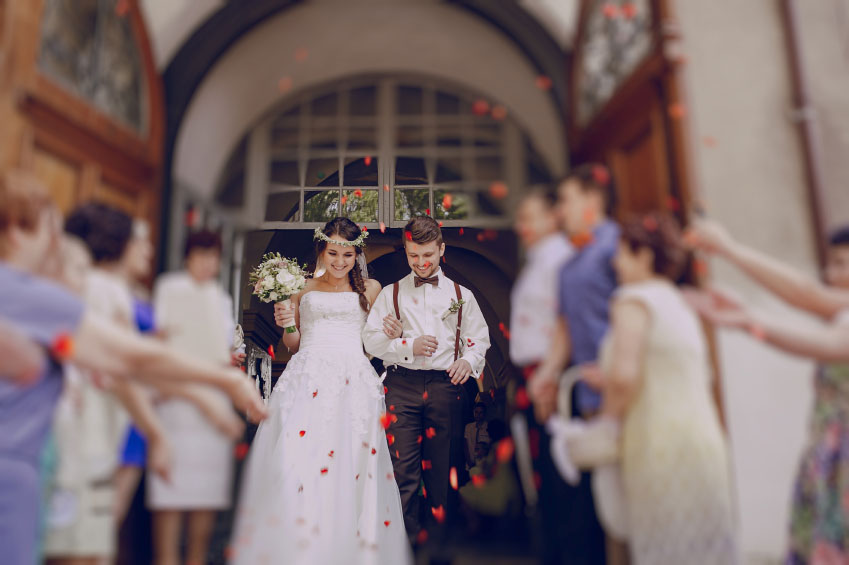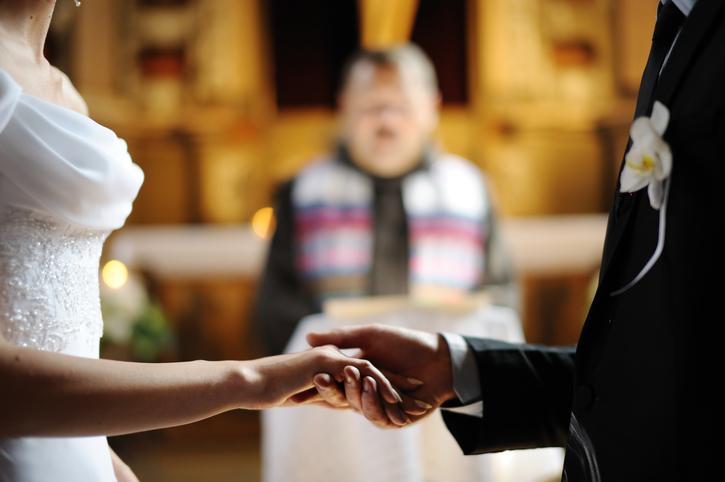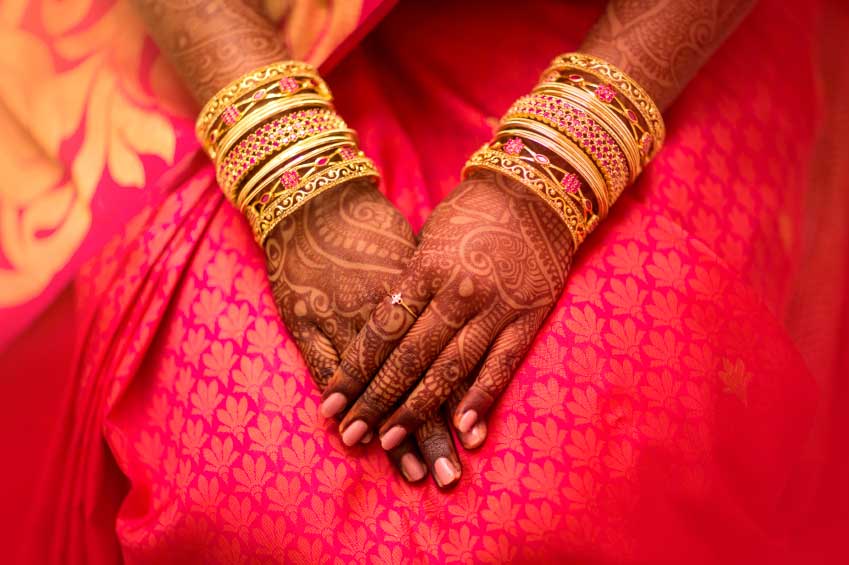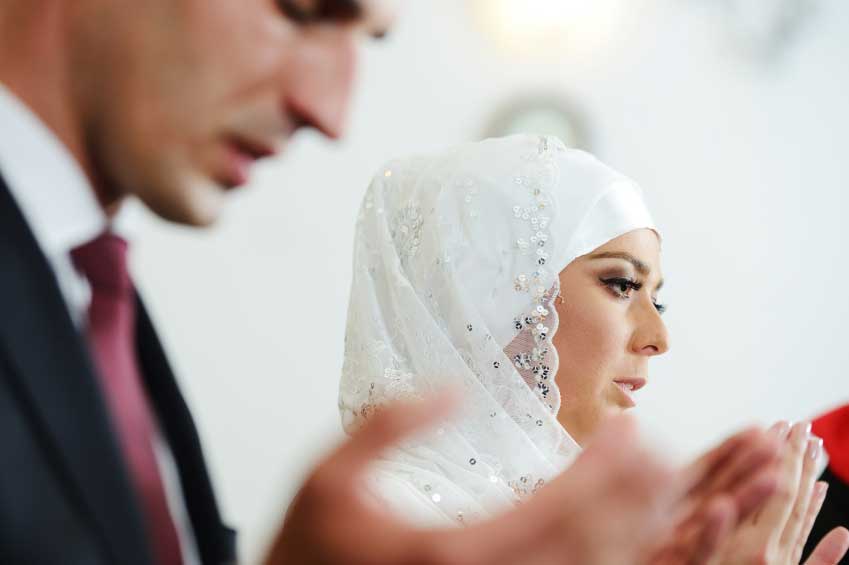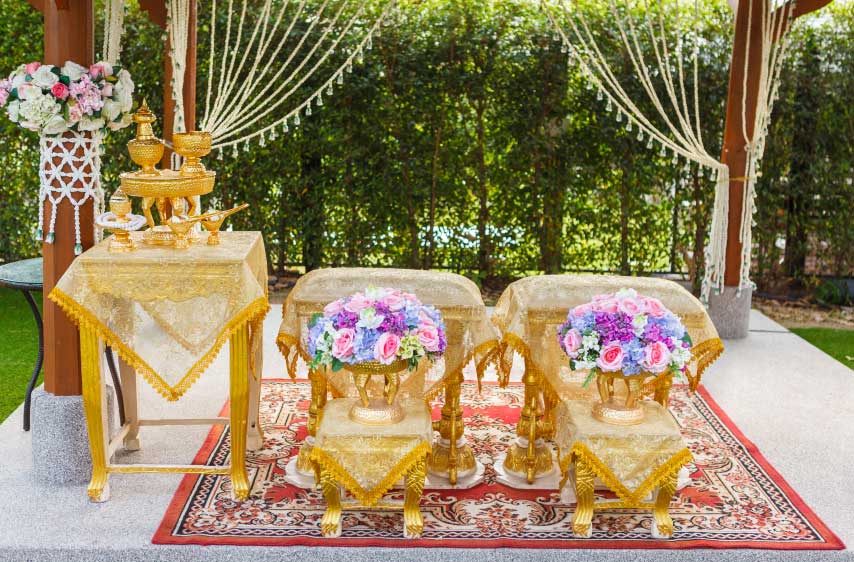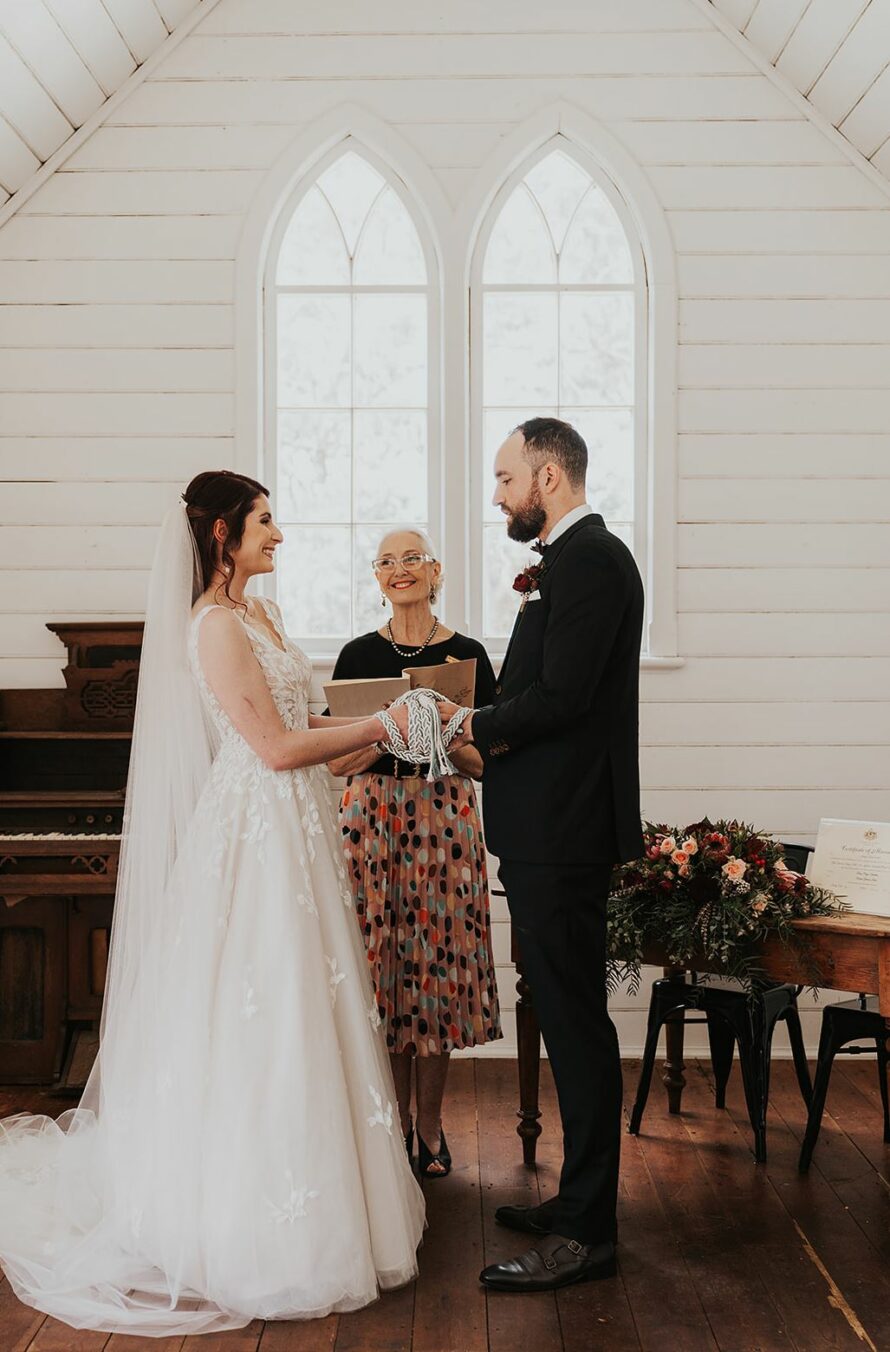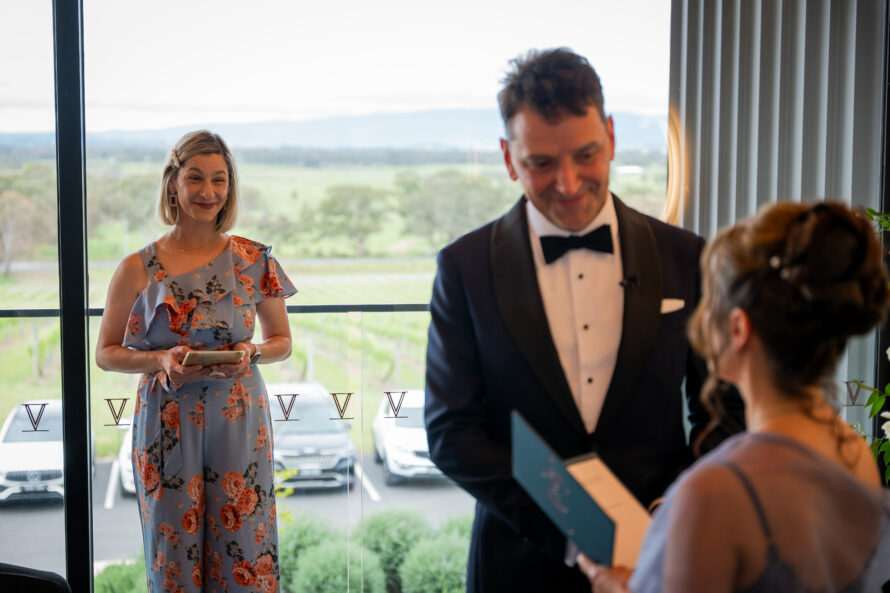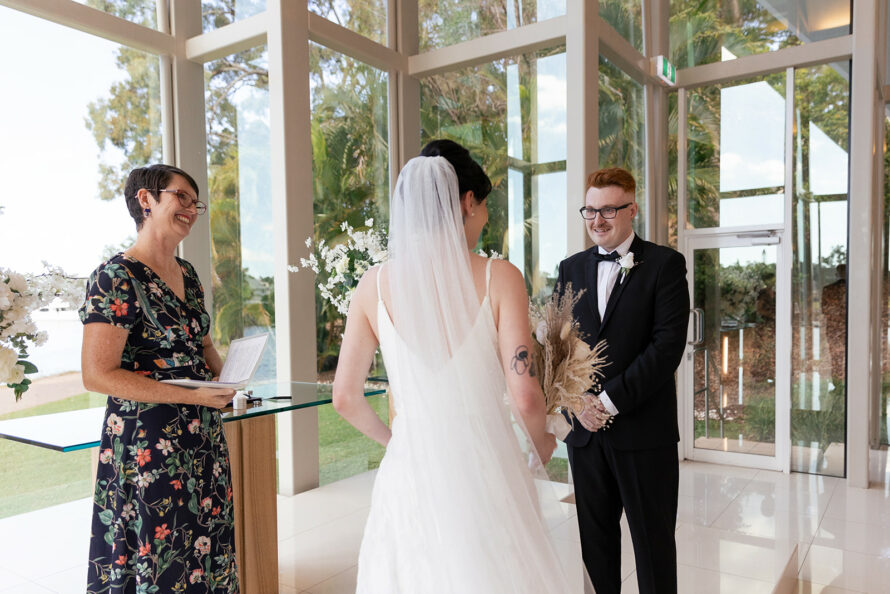Civil ceremonies may make up the majority of wedding ceremonies in Australia, but thousands of religious ceremonies of every denomination still take place every year and, though each religion has it’s own traditional vows, there’s beauty to be found in all of them.
Here are just some of the traditional religious wedding vows you’ll find spoken across the world. Looking for religious readings from a variety of faiths? Find them here.
Catholic wedding vows
The largest Christian Church in the world has long held to tradition and the Nuptial or Wedding Mass is the keystone of a Catholic wedding. Along with readings, music and responses from the congregation, the bride and groom recite the following vows.
‘I, ___, take you, ___, for my lawful wife/husband, to have and to hold from this day forward, for better, for worse, for richer, for poorer, in sickness and health, until death do us part.’
‘I, ___, take you, ___, to be my husband/wife. I promise to be true to you in good times and in bad, in sickness and in health. I will love and honor you all the days of my life.’
Unitarian wedding vows
The Unitarian faith is based on Christianity but believes God is one entity and not the Holy Trinity. Unitarianism began in Transylvania in the 1500s. In a wedding ceremony in a Unitarian church, the minister is free to decide on which vows will be spoken. They are based on the traditional Christian vows such as these.
‘______, will you take ______ to be your wife/husband; love, honor and cherish her/him now and forevermore?’
‘______, will you take ______ as your wife/husband, will you pledge to share your life openly with her/him, to speak the truth to her/him, in love? Will you promise to honor and tenderly care for her/him, to encourage her/him fulfillment as an individual through all the changes in your lives?’
Jewish wedding vows
There are different groups within the Jewish faith but, generally speaking, there are no vows as such in the wedding ceremony. The ritual includes or implies the vows. The placing of the ring by the groom on the bride’s finger seals the ceremony. At that time, the groom will say, ‘Behold, you are consecrated to me with this ring according to the laws of Moses and Israel.’
For Jewish couples who do wish to speak their vows, some Jewish services today include the following vows.
‘Do you, ___, take_____ to be your wife/husband, promising to cherish and protect her/him, whether in good fortune or in adversity, and to seek together with her/him a life hallowed by the faith of Israel?’
Eastern Orthodox vows
The Eastern Orthodox Church, officially known as the Orthodox Catholic Church, is the second-largest Christian church in the world; the Roman Catholic Church being the largest. The Eastern Orthodox Church has no papal head and regards all its bishops as equal. The Eastern Orthodox Church is found mainly in Greece, Eastern Europe and Russia.
During a wedding in this faith, wedding vows are often not spoken. The couple makes their promise of love in a silent prayer. But in Russia, the ceremony does use spoken vows, and the couple recites the following vow.
‘I, ___, take you, ___, as my wedded wife/husband and I promise you love, honor and respect; to be faithful to you, and not to forsake you until death do us part. So help me God, one in the Holy Trinity and all the Saints.’
Hindu wedding vows
A Hindu wedding ceremony is a lengthy and highly-structured service. It involves a flame representing the god of Fire, Agni. The couple recite to one another, what are known as the Seven Steps.
‘Let us take the first step to provide for our household a nourishing and pure diet, avoiding those foods injurious to healthy living.’
‘Let us take the second step to develop physical, mental and spiritual powers.’
‘Let us take the third step to increase our wealth by righteous means and proper use.’
‘Let us take the fourth step to acquire knowledge, happiness and harmony by mutual love and trust.’
‘Let us take the fifth step so that we are blessed with strong, virtuous and heroic children.’
‘Let us take the sixth step for self-restraint and longevity.’
‘Finally, let us take the seventh step and be true companions and remain lifelong partners by this wedlock.’
Protestant wedding vows
It would be nigh on impossible to list the wedding vows of all the Protestant churches currently in existence. According to the Dictionary of Christianity in America, and the Oxford Christian Encyclopedia, in the late 20th century there were more than 20,000 such denominations. Here are a few examples of some of their wedding vows.
Methodist
‘Will you have this woman/man to be your wife/husband, to live together in holy marriage? Will you love her/him, comfort her/him, honor, and keep her/him in sickness and in health, and forsaking all others, be faithful to her/him as long as you both shall live?’
‘In the name of God, I, ______, take you, ______, to be my wife/husband, to have and to hold from this day forward, for better, for worse, for richer, for poorer, in sickness and in health, to love and to cherish, until we are parted by death. This is my solemn vow.’
Presbyterian
‘______, wilt thou have this woman/man to be thy wife/husband, and wilt thou pledge thy faith to him/her, in all love and honor, in all duty and service, in all faith and tenderness, to live with her/him, and cherish her/him, according to the ordinance of God, in the holy bond of marriage?’
‘I, ______, take you, ______, to be my wedded wife/husband, and I do promise and covenant, before God and these witnesses, to be your loving and faithful husband/wife, in plenty and want, in joy and in sorrow, in sickness and in health, as long as we both shall live.’
Episcopal [Anglican in some countries]
‘______, wilt thou have this woman/man to be thy wedded wife/husband to live together after God’s ordinance in the Holy Estate of matrimony? Wilt thou love her/him? Comfort her/him, honor and keep her/him, in sickness and in health, and forsaking all others keep thee only unto her/him as long as you both shall live?’
‘In the name of God, I, ______, take you, ______, to be my wife/husband, to have and to hold from this day forward, for better, for worse, for richer, for poorer, in sickness and health, to love and to cherish, until we are parted by death. This is my solemn vow.’
Muslim vows
The Imam is the cleric in a Muslim wedding ceremony and often he will state the vows for the couple. The Imam tells the couple [and the congregation], that the couple have certain responsibilities to one another and to Allah. When the Imam finishes speaking, the couple acknowledge his words and agree to become husband and wife. Then the whole gathering adds a blessing to the couple.
But some Muslim ceremonies do involve the saying of vows. Here are the vows used in such a wedding ceremony.
The bride recites: ‘I, ___, offer you myself in marriage in accordance with the instructions of the Holy Quran and the Holy Prophet, peace and blessing be upon him. I pledge, in honesty and with sincerity, to be for you an obedient and faithful wife.’
The groom recites: ‘I pledge, in honesty and sincerity, to be for you a faithful and helpful husband.’
Quaker vows
The Society of Friends or Friends Church is often referred to as Quakers. They follow basic Christian teachings although their services and structures are unlike other traditional churches. A Quaker service is not planned as such and may involve long periods of silence. All members are free to speak.
When two Quakers agree to marry, their service will include the following vow.
‘In the presence of God and these our friends I take thee, ______, to be my husband/wife, promising with Divine assistance to be unto thee a loving and faithful husband/wife so long as we both shall live.’
Buddhist wedding vows
Arguably the most flexible of all religious when it comes to wedding vows, a Buddhist couple are permitted to create their own vows and to read them in silence. If vows are spoken, the following examples are usually spoken at a Buddhist wedding.
‘________ and ________, are happy today not only because they can share the joy of their love for each other with friends and family, but also because they have the opportunity to express their aspirations for the future.
________ and ________, do you pledge to help each other to develop your hearts and minds, cultivating compassion, generosity, ethics, patience, enthusiasm, concentration and wisdom as you age and undergo the various ups and downs of life and to transform them into the path of love, compassion, joy and equanimity?’
‘We do.’
Even within the many religious or faith-based wedding ceremonies, there may be scope for personal preference when it comes to wedding vows. Traditionalists will wish to maintain tradition, but it can be helpful to ask if your own wording might be used, at least in part. After all, it is your wedding.
[ew-supplier-carousel]
